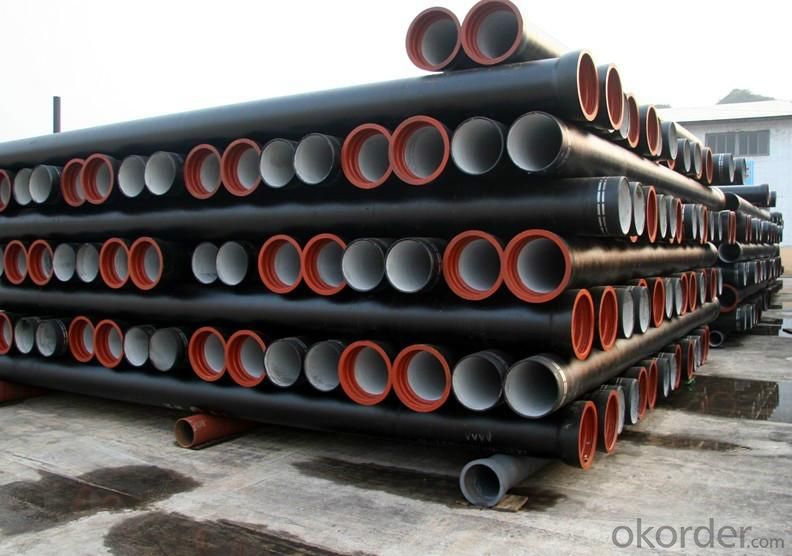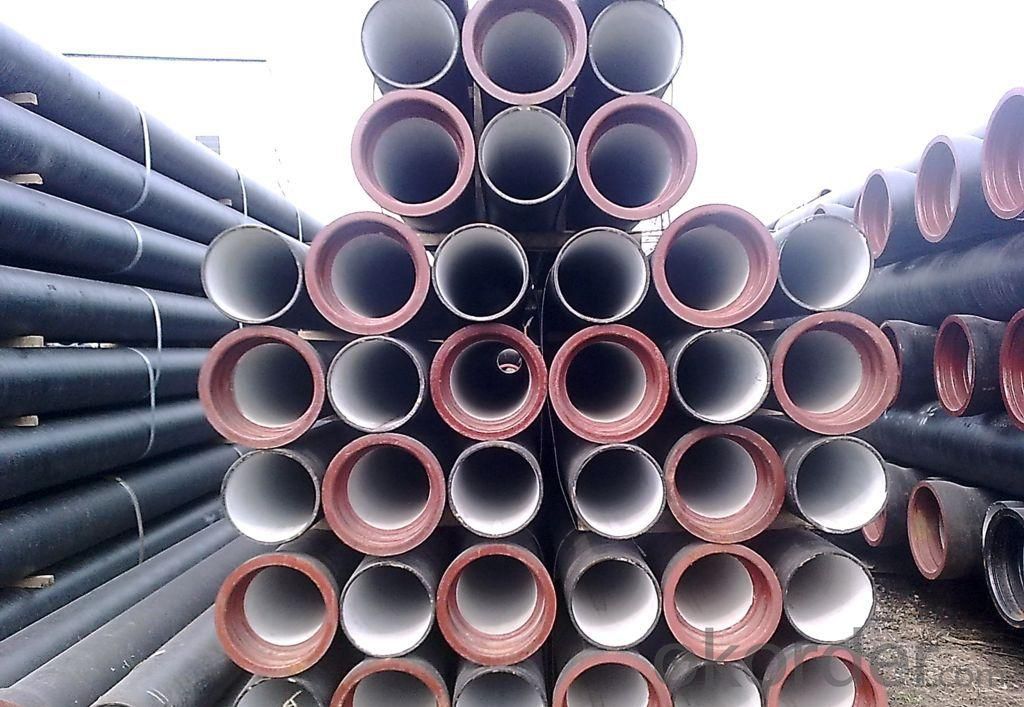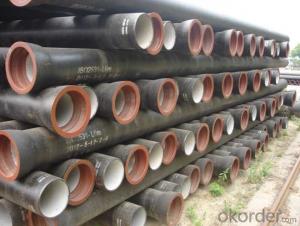Ductile Iron Pipe EN545 DN700 High Quality
- Loading Port:
- China main port
- Payment Terms:
- TT OR LC
- Min Order Qty:
- 999 m
- Supply Capability:
- 9999 m/month
OKorder Service Pledge
OKorder Financial Service
You Might Also Like
1,Ductile Iron Pipe Description :
1) Pipes confirm to ISO2531,K9 class,T type joint,6m long,with inside cements lining conform to ISO4179, outside Zinc spraying(130g/m2) and bitumen coating(70μm) conform to ISO8179.
2) Pipe ends: Spigot and socket ends, with 100% SBR rubber gaskets
accoding to ISO4633
3) we can do third party inspection according to customer's request.
4) Our products have been sold to many international market, such as Middle East and South East Asia and Africa.
2,Main Features of the Ductile Iron Pipe:
•High yield strength
•High corrosion resistance
•Installation is convenient
•Satisfy the highest hygienic standards
1. Material: Ductile iron grade 500-7/ 450-10 in accordance with ISO1083
2. Standard: ISO 2531, EN545, EN598, ANSI, AWWA
3. Certificate: ISO9001, ISO14001, SGS, NSF, WRAS
4. Test: In accordance with ISO 2531 / EN 545 / EN598 and 100% water pressure test
5. Length: 6m or cut into 5.6m, 5.7m, 5.8m
6. Internal Lining: Cement, conform to ISO4179
7. External coating: Zinc + Bitumen, conform to ISO8179
3,Ductile Iron Pipe Images:


4. Ductile Iron Pipe Specification
Subsidiary of Forbes Fortune 500 company (Ranking 485th in 2011).
Provides full rang of ductile iron pipes with finest quality.
Surface Finishes Bare, Oiled, Mill Varnish, Galv,FBE, FBE Dual,
3LPE, 3LPP, Coal Tar,Concrete Coating and Tape Wrap
End Finishes Beveled, Square Cut, Threaded, hat
Additional Services Internal Coating
Packaging packed in bag, plastic bag, steel strip, steel wire,double wire, iron box, wooden box, tarpaulin,
plastic sheeting
Inspection MOODY SGS BV GL DNV ABS LIOYD’S
Test X-ray, UT, magnetic particle,inspection,hydrostatic test.
Processing service Beveling, Threading, Slotting, Cut-to length, Bends, Quench and Temper, Fabrication, Double-jointing and On-site assistance
Documentary MTC, material certification,Origin certification, CI or PI,Test Report, export licence, handling order, B/L,insurance policy,shipping instructions, contract, packing list etc.
5.FAQ:
We have organized several common questions for our clients,may help you sincerely:
1.Q: Why would you choose ductile iron pipe rather than other pipe materials?
A:The reasons are obvious for that not only ductile iron pipe possesses the inherent strength and flexibility of ductile iron, combined with proven corrosion protection systems, but also the cost savings can be achieved from design to installation and commissioning.
2.Q:Why can you guarantee the inner of pipes can’t be corroded?
A: High alumina cement mortar lining and sulphate-resistant cement mortar lining. These two special linings are applicable to inner anti-corrosion for sewage pipes, improving resistance to erosion of the sewage components.
- Q:Can ductile iron pipes be used for marine applications?
- Yes, ductile iron pipes can be used for marine applications. Ductile iron has excellent corrosion resistance properties, making it suitable for use in marine environments where exposure to saltwater and other corrosive elements is common. Additionally, its high strength and durability make it a reliable choice for various marine applications such as seawater intake and discharge systems, offshore platforms, and marine pipelines.
- Q:Maximum pipe diameter of ductile iron pipe
- What I know is that the new ductile iron pipes can reach 2400MM, which can be checked by the official website
- Q:Can ductile iron pipes be used for offshore oil and gas installations?
- Yes, ductile iron pipes can be used for offshore oil and gas installations. Ductile iron is a type of cast iron that offers excellent strength and durability, making it suitable for various applications including offshore environments. These pipes have high tensile strength and are resistant to corrosion, making them ideal for transporting oil and gas in harsh offshore conditions. Ductile iron pipes are often used for subsea pipelines, risers, and flowlines due to their ability to withstand high pressures and resist external forces such as waves, currents, and impacts. They are also capable of handling the high temperatures and pressures associated with offshore oil and gas production. Furthermore, ductile iron pipes have a long service life and require minimal maintenance, reducing the overall operating costs for offshore installations. They are also readily available and cost-effective compared to other materials such as steel. However, it is important to consider factors such as the specific requirements of the project, environmental conditions, and the compatibility of ductile iron with other materials used in the offshore installation. Proper engineering analysis and design considerations should be undertaken to ensure the suitability and safety of ductile iron pipes for offshore oil and gas installations.
- Q:Can ductile iron pipes be used for water supply in buildings?
- Ductile iron pipes are indeed a viable option for water supply in buildings. Renowned for their strength, durability, and resistance to corrosion, these pipes are well-suited for a wide range of uses, including water supply systems. With their impressive tensile strength, they can endure high-pressure conditions, making them perfect for delivering water to buildings. Furthermore, ductile iron pipes boast a lengthy lifespan, minimizing the necessity for frequent replacements. They also display excellent flow properties, facilitating efficient water distribution within structures. Consequently, ductile iron pipes are a dependable and frequently selected choice for water supply systems in buildings.
- Q:Are there any limitations to the length of ductile iron pipe sections?
- Limitations exist regarding the length of ductile iron pipe sections. Typically, these limitations stem from practical concerns such as transportation, installation, and handling. Longer pipe sections can present difficulties when it comes to transportation and maneuverability, particularly in areas with limited access or challenging terrain. Moreover, longer pipe sections may be more susceptible to damage during installation since proper alignment and joining can be more challenging. Manufacturing capabilities also impose limitations. Ductile iron pipes are typically produced in standard lengths, which can vary depending on the manufacturer and the specific application. These standard lengths are designed to strike a balance between transportation, installation, and overall pipe performance. In addition, longer pipe sections may pose challenges related to temperature variations and subsequent expansion and contraction. Ductile iron pipes are prone to thermal expansion and contraction, and longer sections may experience greater stress and strain as a result. Therefore, while there is no definitive maximum length for ductile iron pipe sections, practical considerations and manufacturing capabilities dictate the use of standard lengths that consider various factors such as transportation, installation, and performance.
- Q:General cast iron prices now
- Regular cast iron prices now range between 5000 and 8000.Ductile iron is a kind of high strength cast iron material developed in 50s twentieth Century, its comprehensive performance is close to the steel, it is based on its excellent performance, has been successfully used in casting complex stress, strength, toughness and wear resistance requirements of the higher parts. Nodular cast iron has developed rapidly to be second only to grey cast iron and widely used as cast iron material. The so-called "iron instead of steel", mainly refers to ductile iron.
- Q:Can ductile iron pipes be used in acidic environments?
- Yes, ductile iron pipes can be used in acidic environments. Ductile iron has excellent resistance to corrosion, including acidic conditions, due to its protective oxide layer. This makes it a suitable choice for applications in which exposure to acids is expected.
- Q:Are ductile iron pipes resistant to chloride-induced corrosion?
- Yes, ductile iron pipes are resistant to chloride-induced corrosion. Ductile iron is a type of cast iron that has been treated with magnesium to make it more flexible and resistant to cracking. It has a ferritic microstructure which provides excellent resistance to corrosion caused by chlorides. Chloride-induced corrosion can occur when chloride ions in the water or soil come into contact with the metal surface, leading to the formation of corrosion products such as rust. However, the presence of magnesium in ductile iron forms a protective layer on the surface, preventing the chloride ions from reaching the metal and thus inhibiting corrosion. This makes ductile iron pipes suitable for a wide range of applications, including water supply and sewerage systems, where chloride exposure is common.
- Q:Can ductile iron pipes be used for underwater installations?
- Indeed, underwater installations can make use of ductile iron pipes. Ductile iron, renowned for its robustness and longevity, exhibits a remarkable resistance to corrosion, rendering it well-suited for submerged applications. Moreover, the exceptional joint integrity of ductile iron pipes guarantees their impermeability, even when subjected to substantial hydrostatic pressure. To bolster their resistance to corrosion and prolong their lifespan in underwater settings, these pipes are often coated with protective linings and coatings. All in all, ductile iron pipes are a dependable option for underwater installations due to their formidable strength, durability, and corrosion resistance attributes.
- Q:What is the expected bending stress capacity of ductile iron pipes?
- The expected bending stress capacity of ductile iron pipes can vary depending on various factors such as the pipe's diameter, wall thickness, and the specific grade of ductile iron used. However, generally speaking, ductile iron pipes have a high bending stress capacity compared to other pipe materials. Ductile iron pipes are known for their high tensile strength and flexibility, making them capable of withstanding significant bending stresses. The exact bending stress capacity can be determined through rigorous testing and analysis by considering factors like the pipe's mechanical properties, dimensions, and the maximum allowable deflection. It is important to note that the bending stress capacity of ductile iron pipes should be evaluated in accordance with industry standards and guidelines. These may include standards such as the American Water Works Association (AWWA) C150 or International Organization for Standardization (ISO) 2531, which provide specifications and testing methods for ductile iron pipes. Ultimately, the expected bending stress capacity of ductile iron pipes is determined by several factors and should be assessed based on the specific requirements of the application, considering industry standards and guidelines for accurate and reliable results.
1. Manufacturer Overview |
|
|---|---|
| Location | |
| Year Established | |
| Annual Output Value | |
| Main Markets | |
| Company Certifications | |
2. Manufacturer Certificates |
|
|---|---|
| a) Certification Name | |
| Range | |
| Reference | |
| Validity Period | |
3. Manufacturer Capability |
|
|---|---|
| a)Trade Capacity | |
| Nearest Port | |
| Export Percentage | |
| No.of Employees in Trade Department | |
| Language Spoken: | |
| b)Factory Information | |
| Factory Size: | |
| No. of Production Lines | |
| Contract Manufacturing | |
| Product Price Range | |
Send your message to us
Ductile Iron Pipe EN545 DN700 High Quality
- Loading Port:
- China main port
- Payment Terms:
- TT OR LC
- Min Order Qty:
- 999 m
- Supply Capability:
- 9999 m/month
OKorder Service Pledge
OKorder Financial Service
Similar products
New products
Hot products
Related keywords



























